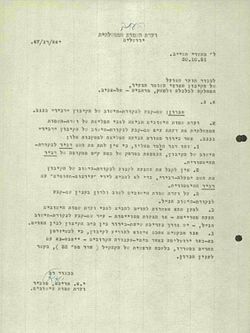Government Naming Committee

Government Naming Committee[1] (Hebrew: ועדת השמות הממשלתית, sometimes referred as National Naming Committee or Government Names Committee)[2] is a public committee appointed by the Government of Israel, which deals with the designation of names for communities and other points on the map of Israel, and the replacement of Arabic names that existed until 1948 with Hebrew names. The committee's decisions bind state institutions.
In the naming process, the committee relies on historical names, the translation of Arabic names, and giving a Hebrew form to Arabic names.
See also
[edit]References
[edit]- ^ Barak Ravid, In Arabic and in Hebrew, a Name Is More Than Just a Name Archived 2018-06-13 at the Wayback Machine, on Haaretz website in English, December 15, 2011
- ^ Bitan, Hana (1992). "Government Names Committee". Eretz-Israel: Archaeological, Historical and Geographical Studies (in Hebrew). 23. Israel Exploration Society: 366–370. JSTOR 23623609.
External links
[edit]![]() Media related to Government Naming Committee at Wikimedia Commons
Media related to Government Naming Committee at Wikimedia Commons
Text is available under the CC BY-SA 4.0 license; additional terms may apply.
Images, videos and audio are available under their respective licenses.
